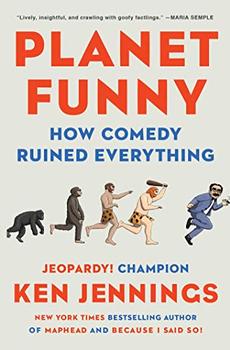Summary | Excerpt | Reviews | Beyond the Book | Readalikes | Genres & Themes | Author Bio

Critics' Opinion:
Readers' Opinion:
First Published:
May 2018, 320 pages
Paperback:
Jul 2019, 320 pages
 Book Reviewed by:
Book Reviewed by:
Norah Piehl
Buy This Book
Two months after sports got funny, a similar milestone, also spurred on by a single force of personality, changed another corner of pop culture: the lowly comic book. At the time, superhero comics were in a snoozy decline, still dominated, as they had been for decades, by Superman and Batman and the other square-jawed champions of DC Comics. Superman and Batman weren't the gritty, mutually suspicious rivals we see today on the big screen; in 1960 they were loyal chums who co-headlined World's Finest Comics every month. They both had dogs and boy sidekicks and secret clubhouses full of trophies, and planned each other surprise parties and treasure hunts every year for their birthdays.
The wake-up call was the November 8, 1961, publication of The Fantastic Four #1 by Jack Kirby and Stan Lee, the debut of an innovative new superhero line from Marvel Comics. Today, the conventional wisdom about Marvel is that their books took off because their superheroes were, unlike DC's demigods, human and relatable. The core dynamic of the Fantastic Four was that they weren't just a super-team but a family, with all the squabbles and growing pains and sentimental "mush" that entails. Spider-Man fought crooks in between long anxious thought balloons about his money troubles, or his sick Aunt May, or the kids who bullied him at his Queens high school. The Mighty Marvel Way was nothing more than grafting soap opera elements onto traditional superhero tropes, and the publisher would successfully stick with that human-interest formula for decades: Iron Man was an alcoholic, Daredevil was blind, the Hulk just wanted to be left alone, the teenage X-Men were battling both their hormones and society's bigotry. Soon, the rest of the industry was scurrying to catch up.
But what really made those early Marvel comics such a pleasure to read was that, despite all the adolescent angst, they were genuinely funny. For one thing, the heroes themselves were jokers. Ben Grimm, the Fantastic Four's rocky "Thing," spent his days in a perpetual vaudeville slow burn at the infuriating antics of his teammate the Human Torch, not to mention the pranks of the "Yancy Streeters," a gang of roughnecks from his Lower East Side neighborhood. "What a revoltin' development!" he would complain, in imitation of Jimmy Durante, or maybe William Bendix on The Life of Riley. Peter Parker, the amazing Spider-Man, had an even lighter comic touch, using wisecracks to mask his own teenage insecurities and surprising foes just as often with a snarky put-down as with his trademark webs. "Spider-Man!" Doctor Octopus or whoever would snarl. "Well it's not Dr. Kildare," Spidey would reply. Or "I sure ain't Albert Schweitzer!" Compared to the stodgy dads fighting crime over in DC's books, these were hip references.
Every issue was narrated in the knowing, irreverent voice of scripter-editor Stan Lee, immediately creating an over-the-top house style that defined Marvel for decades. "Like costume heroes?" Lee asked with a wink in the comic that introduced Spider-Man. "Confidentially, we in the comic mag business refer to them as 'long underwear characters'!" Marvel fans weren't just readers—they were in on the gag. This clubby relationship carried over into the letters pages, where Lee answered reader mail personally in an unidentifiable borderline-youthful patois of his own invention, somewhere in between "Greenwich Village hepcat" and "carnival barker." Every staffer and freelancer got credited with a nickname emphasizing just how fun it must be to goof around in the Marvel bullpen all day: "Smilin'?" Stan Lee, "Jolly" Jack Kirby, "Cheerful" Chic Stone, "Merry" Marie Severin. Superhero comic books, for the first time in a long time, were actually comic books.
Laughing Through a Mouthful of Tapioca Foam
The dominoes kept falling as the twentieth century neared its end. The same wave of postmodernism that had turned architecture on its ear had long since become the language of fashion as well, with designers regularly praised for their "witty" new collections. With shelter and clothing taken care of, just one basic survival need remained stubbornly unamusing: food. Shout-out to food for providing us with the basic caloric content and nutrients needed to sustain life—but why wasn't it funnier?
Excerpted from Planet Funny by Ken Jennings. Copyright © 2018 by Ken Jennings. Excerpted by permission of Scribner. All rights reserved. No part of this excerpt may be reproduced or reprinted without permission in writing from the publisher.





The House on Biscayne Bay
by Chanel Cleeton
As death stalks a gothic mansion in Miami, the lives of two women intertwine as the past and present collide.

The Flower Sisters
by Michelle Collins Anderson
From the new Fannie Flagg of the Ozarks, a richly-woven story of family, forgiveness, and reinvention.

The Funeral Cryer by Wenyan Lu
Debut novelist Wenyan Lu brings us this witty yet profound story about one woman's midlife reawakening in contemporary rural China.
Your guide toexceptional books
BookBrowse seeks out and recommends the best in contemporary fiction and nonfiction—books that not only engage and entertain but also deepen our understanding of ourselves and the world around us.